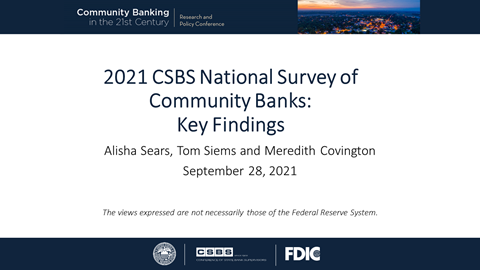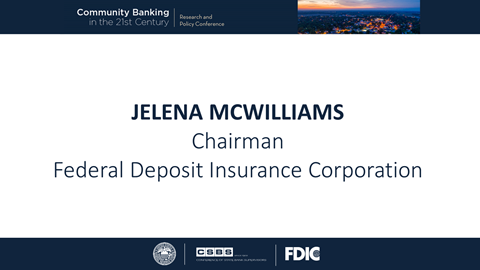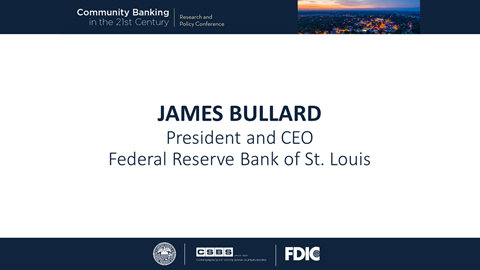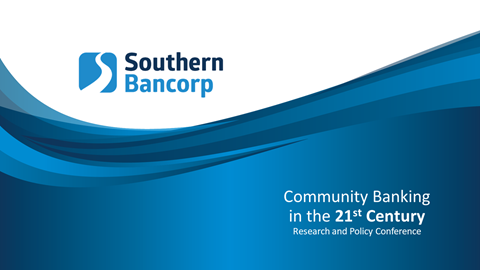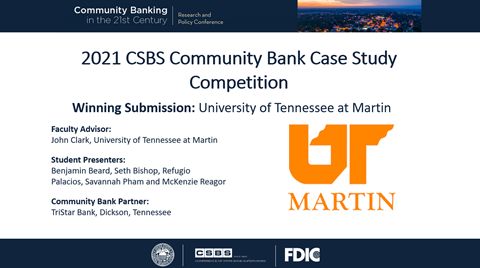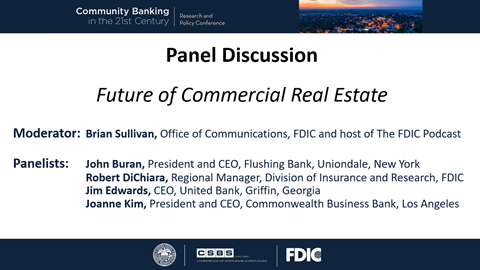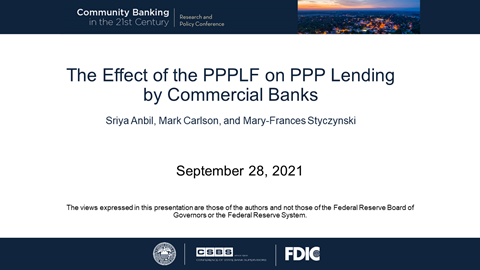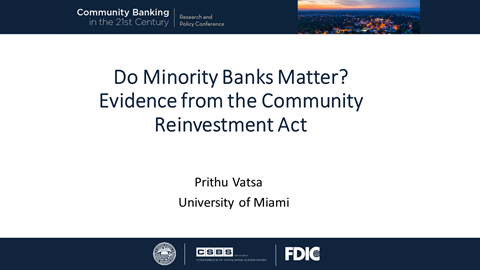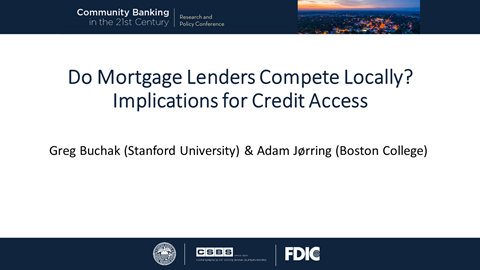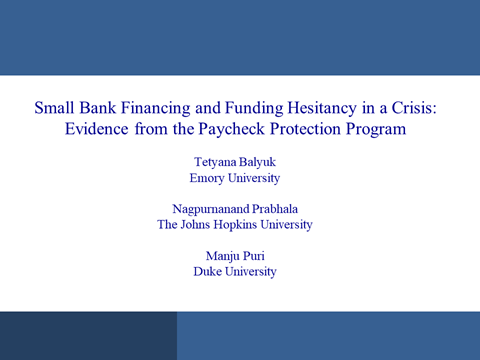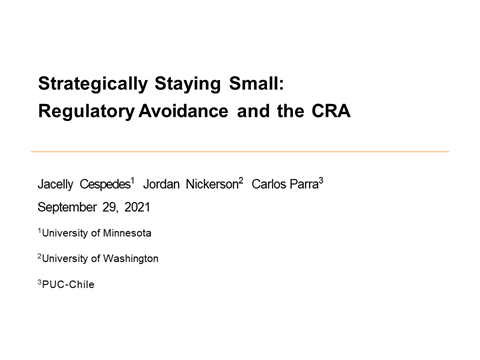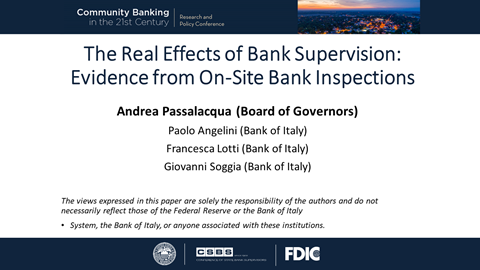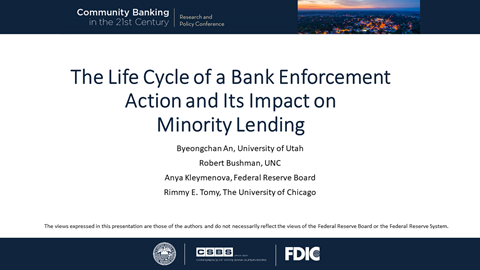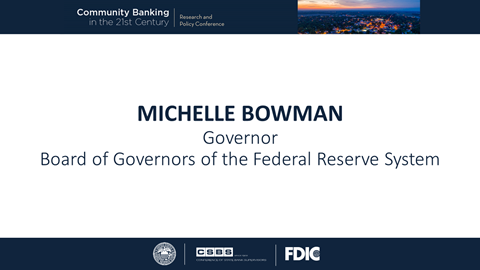
2021 Community Banking in the 21st Century Research and Policy Conference
Taking place virtually on Sept. 28 and Sept. 29, the research conference will bring together community bankers, academics, policymakers and bank regulators to discuss the latest research on community banking.
Community Banking in the 21st Century
The ninth annual Community Banking in the 21st Century research and policy conference—sponsored by the Federal Reserve System, the Conference of State Bank Supervisors (CSBS) and the Federal Deposit Insurance Corp. (FDIC)—will be hosted as a virtual event spanning two afternoon sessions on Sept. 28 and Sept. 29, 2021. The conference brings together community bankers, academics, policymakers and bank regulators to discuss the latest research on community banking.
The conference presents an innovative approach to the study of community banks. Academics explore issues raised by the industry in a neutral, empirical manner and present their findings at the conference. Community bankers contribute to an annual national survey prior to the conference and then participate directly in the conference by serving as keynote speakers and panelists, and by providing feedback to the research presented. For more information, please contact conference@communitybanking.org.
Conference Agenda
2021 Conference Hosted Virtually via WebEx | Livestream via communitybanking.org | All Times Reflected in ET
September 28-29, 2021
Download as PDF
- Tuesday, September 28
-
Welcome
-
Presentation of Findings from the 2021 CSBS National Survey of Community Banks
-
Keynote Remarks
-
Break
-
Concurrent Research Paper Session 1
Paycheck Protection Program (PPP) Lending Moderator: Gregory Udell
Moderator: Gregory Udell
Chase Chair of Banking and Finance at the Kelley School of Business, Indiana University
 Community Bank Discussant: David Krause
Community Bank Discussant: David Krause
Chairman and CEO, Pioneer Bank of Mankato, Mankato, Minnesota
Government Loan Guarantees in a Crisis: Bank Protections from Firm Safety NetsPadma Sharma, Federal Reserve Bank of Kansas CityThe Effect of the PPPLF on PPP Lending by Commercial BanksSriya Anbil, Board of Governors of the Federal Reserve SystemModerator ResponseDiscussant ResponseModerated Q&A -
Concurrent Research Paper Session 2
Credit Provision to Marginalized BorrowersDiscussant ResponseModerated Q&A -
Break
-
Keynote Remarks
-
Wrap-Up
- Wednesday, September 29
-
Community Banker Keynote
-
2021 CSBS Winning Case Study
University of Tennessee at MartinFaculty AdvisorJohn Clark, interim director, Horace and Sara Dunagan Chair of Excellence in Banking, University of Tennessee at Martin
Community Bank PartnerTriStar Bank, Dickson, Tennessee
-
Break
-
Concurrent Research Paper Session 3
Unintended Effects of Oversight Moderator: Christa Bouwman
Moderator: Christa Bouwman
Associate Professor of Finance and Patricia & Bookman Peters Professor of Finance, Texas A&M University
Strategically Staying Small: Regulatory Avoidance and the Community Reinvestment ActCarlos Parra, Pontifical Catholic University of ChileSmall Bank Financing and Funding Hesitancy in a Crisis: Evidence from the Paycheck Protection ProgramTetyana Balyuk, Emory UniversityModerator ResponseDiscussant ResponseModerated Q&A -
Concurrent Research Paper Session 4
The Effect of Bank Supervision on Credit Allocation Community Bank Discussant: C.K. Lee
Community Bank Discussant: C.K. Lee
President and Chief Operating Officer, InterBank, Oklahoma City, Oklahoma
The Real Effects of Bank Supervision: Evidence from On-Site Bank InspectionsAndrea Passalacqua, Analysis Group Inc.The Life Cycle of a Bank Enforcement Action and Its Impact on Minority LendingRimmy Tomy, The University of ChicagoModerated QA -
Break
-
Panel Discussion: Future of Commercial Real Estate
Panelists -
Pre-Recorded Research Paper Session
Determinants of Losses on Construction Loans: Bad Loans, Bad Banks, or Bad Markets?Lynn Shibut, Federal Deposit Insurance Corp.- FDICMandatory Disclosure and Takeovers: Evidence from Private BanksJing Wen, City University of Hong KongFighting Failure: The Persistent Real Effects of Resolving Distressed BanksIvan Ivanov, Federal Reserve Bank of Chicago
Research Papers, Authors and Key Findings
Concurrent Research Paper Session 1
Paycheck Protection Program (PPP) Lending
Government Loan Guarantees in a Crisis: Bank Protections from Firm Safety Nets
Authors: Padma Sharma, Federal Reserve Bank of Kansas City; W. Blake Marsh, Federal Reserve Bank of Kansas City
Key Findings: The authors provide empirical evidence that community bank participation in the Paycheck Protection Program (PPP): was driven by risk aversion rather than profitability; was concentrated among banks with ample funding; and mitigated potential declines in business lending and net interest income. They conclude the PPP not only fulfilled small businesses' funding needs during the pandemic, but also indirectly supported the margins of banks that made these loans.
The Effect of the PPPLF on PPP Lending by Commercial Banks
Authors: Sriya Anbil, Board of Governors of the Federal Reserve System; Mark Carlson, Board of Governors of the Federal Reserve System; Mary-Frances Styczynski, Board of Governors of the Federal Reserve System
Key Findings: The authors analyze the role of the Federal Reserve’s Paycheck Protection Program Liquidity Facility (PPPLF) in providing credit to small businesses under the Paycheck Protection Program. They found commercial banks using the PPPLF extended more than twice as many loans, relative to their total assets, as banks that did not use the PPPLF. They also found banks’ familiarity with the operation of the Federal Reserve’s discount window [strongly predicts whether] banks register with and utilize the PPPLF.
Moderator Response
Discussant Response
Moderated Q&A
Concurrent Research Paper Session 2
Credit Provision to Marginalized Borrowers
Do Minority Banks Matter?
Author: Prithu Vatsa, University of Miami
Key Findings: This paper empirically examines the elasticity of minority credit supply to deposit shares of minority depository institutions (MDIs). The author found a significant and persistent minority credit supply gap results when a neighborhood loses the presence of a local minority-owned bank. MDIs also significantly reduce the minority homeownership gap. The author’s findings reveal minority credit declined by 37% for up to six years in census tracts that lose their MDIs. Minority credit decline is more severe in census tracts that physically lose an MDI branch.
Do Mortgage Lenders Compete Locally? Implications for Credit Access
Authors: Adam Jørring, Boston College; Greg Buchak, Stanford University
Key Findings: The authors’ analysis of household credit access shows that local market concentration strongly affected lending standards and upfront fees on mortgages. It also resulted in higher application rejection rates and reduced the risk of originated mortgages. These findings suggest that, contrary to current policy, regulators concerned with credit access should regard mortgage markets as local when making policy decisions such as bank merger approvals.
Discussant Response
Moderated Q&A
Concurrent Research Paper Session 3
Unintended Effects of Oversight
Strategically Staying Small: Regulatory Avoidance and the Community Reinvestment Act
Authors: Carlos Parra, Pontifical Catholic University of Chile; Jordan Nickerson, MIT; Jacelly Cespedes, University of Minnesota
Key Findings: A 1995 revision to the Community Reinvestment Act (CRA) led to a two-tiered evaluation scheme determined by the size of a bank's assets. While the intention for the 1995 reform was to “replace paperwork and uncertainty with greater performance, clarity, and objectivity," the revisions also included the creation of two bank classifications: small banks and large banks. Determined by year-end assets being greater or less than $250 million, banks in each group faced significantly different regulatory requirements, creating an incentive to strategically manage assets to stay below the small bank threshold of $250 million. By bunching banks below the small bank threshold, the authors found that banks exploited the 1995 revision of the Community Reinvestment Act (CRA) by strategically slowing growth. They also found regulatory avoidance increased rejection rates of low- and moderate-income loans and decreased the county-level share of small establishments. Taken together, the authors’ findings reveal an unintended consequence of the CRA, whereby strategic avoidance of the regulation reduces credit access for individuals the CRA is designed to benefit.
Small Bank Financing and Funding Hesitancy in a Crisis: Evidence from the Paycheck Protection Program
Authors: Tetyana Balyuk, Emory University; Nagpurnanand Prabhala, The Johns Hopkins University; Manju Puri, Duke University
Key Findings: The authors studied the delivery of subsidized financing to small businesses through bank intermediaries in the Paycheck Protection Program (PPP). Emspirical findings revealed larger firms gained earlier PPP access, consistent with banks’ priorities shaping the PPP delivery. However, the authors found this was not always the case, particularly for small banks that had established prior relationships with their respective small business customers, which likely reflects the importance of small firms for small banks. The findings reinforce the existing banking literature in suggesting small businesses benefit from pairing up with small banks. In addition, the authors found hesitancy in PPP participation reflected recipients' wariness of government investigative power over recipients.
Moderator Response
Discussant Response
Moderated Q&A
Concurrent Research Paper Session 4
The Effect of Bank Supervision on Credit Allocation
The Real Effects of Bank Supervision: Evidence from On-Site Bank Inspections
Authors: Andrea Passalacqua, Analysis Group Inc.; Paolo Angelini, Bank of Italy; Francesca Lotti, Bank of Italy; Giovanni Soggia, Bank of Italy
Key Findings:
The authors show bank supervision reduces distortions in Italian credit markets and generates positive spillovers for the real economy. After an audit, financial intermediaries are more likely to reclassify loans as non-performing and make loans to more productive firms. As a result, productive firms invest more in labor and capital and as a result they grow faster. At the aggregate level, local economies experience an increase in the number of new companies, employment, and productivity. Taking together these results reveal that bank supervision is an important complement to regulation in improving credit allocation.
The Life Cycle of a Bank Enforcement Action and Its Impact on Minority Lending
Authors: Rimmy Tomy, The University of Chicago; Byeongchan An, The University of Chicago; Robert Bushman, University of North Carolina; Anya Kleymenova, Board of Governors of the Federal Reserve System
Key Findings: This paper studies the role bank supervision plays in improving access to credit for minorities by investigating how enforcement decisions and orders (EDOs) affect bank borrowers. The authors find banks significantly increase residential mortgage lending to minorities after the termination of an EDO and increase their market share of lending to this group in counties where they operate. EDO banks are also less likely to deny loans to minority borrowers. The paper explores various reasons for this expansion of lending to minority communities, including remediation of issues, increased competition from non-EDO banks, and catering to banks’ regulators to influence their perceptions and gain future leniency. The paper finds evidence in support of the catering mechanism. In particular, the authors find that banks with stricter regulators, more severe enforcement actions, and low CRA ratings are more likely to increase lending to minorities after EDO terminations.
Moderated QA
Pre-Recorded Research Paper Session
Determinants of Losses on Construction Loans: Bad Loans, Bad Banks, or Bad Markets?
Authors: Lynn Shibut, Federal Deposit Insurance Corp.- FDIC; Emily Johnston Ross, Federal Deposit Insurance Corp.- FDIC; Joseph Nichols, Board of Governors of the Federal Reserve System
Key Findings: In this study, the authors explored the extent to which observed losses on construction loans were driven by characteristics of the loans, originating banks and local markets. They found that risk exposure on construction loan portfolios was influenced not only by the originating bank’s behavior but also by the behavior of other local lenders in the market at the time of origination. The authors’ findings support existing regulatory guidance regarding higher capital requirements for construction loans.
Mandatory Disclosure and Takeovers: Evidence from Private Banks
Authors: Jing Wen, City University of Hong Kong; Urooj Khan, The University of Texas; Doron Nissim, Columbia University
Key Findings: The authors investigated the role of mandatory financial disclosure in the takeover market for privately held U.S. banks. They found that banks with reduced frequency and granularity of regulatory reporting experienced a relatively lower likelihood to be targeted in M&As and their acquirers encountered lower bid-announcement stock returns following a quasi-exogenous regulatory change in March 2015. This is consistent with acquirers relying on public information to identify potential targets and to conduct preliminary due diligence.
Fighting Failure The Persistent Real Effects of Resolving Distressed Banks
Authors: Ivan Ivanov, Federal Reserve Bank of Chicago; Stephen Karolyi, Office of the Comptroller of the Currency (OCC)
Key Findings: In this study, the authors show empirically that resolutions of distressed banks lead to reductions in employment and establishment growth of up to six percentage points. These effects are concentrated in small, less urban counties, and accompanied by large declines in business lending and increases in corporate bankruptcies. These results imply that acquiring banks restrict lending to the small business borrowers of distressed target banks.
Speakers and Panelists

Sriya Anbil is a group manager in the Money Market Analysis section of the Division of Monetary Affairs with the Board of Governors of the Federal Reserve System. Her main research interests are in the areas of banking and financial history. Her research has been published in numerous journals including the Journal of Financial Economics, the Journal of Financial Intermediation, AEA Papers and Proceedings, and the International Journal of Central Banking. Anbil received her Ph.D. in Financial Economics from the School of Management at Yale University. Prior to obtaining her Ph.D., she was an associate on the equity derivatives trading desk at Bank of America Merrill Lynch in New York. Anbil received her bachelor’s degree in electrical engineering from the University of Texas at Austin.

Tetyana Balyuk is an assistant professor of finance at the Goizueta Business School, Emory University. She received her Ph.D. in Finance from the Joseph L. Rotman School of Management, University of Toronto and a CSc and an MSc in International Economics from the Taras Shevchenko National University of Kyiv, Ukraine. Prior to her position at Emory University, Balyuk was an assistant professor of international finance at the Taras Shevchenko National University of Kyiv and an economic adviser for Telenor Group Ukraine.
Balyuk conducts empirical research on financial technology (fintech) and lending. She is interested in the delivery of Paycheck Protection Program funds to small businesses through banks, the ability of fintech innovations to mitigate credit constraints, and the effects of the issuance of information-intensive debt on corporations. Balyuk's research projects link her line of inquiry to literature on capital structure, financial intermediation and household finance. Her research received the Northern Finance Association's Best Paper on FinTech Award in September 2016.

Taylor Begley is an assistant professor of finance at the Olin Business School at Washington University in St. Louis. His research interests include financial intermediation, financial regulation and housing markets. His recent research uncovers unintended consequences of various financial regulations and government lending programs, including those that exacerbate existing racial disparities in credit access. His work has been published in the Review of Financial Studies and the Journal of Financial Economics. Begley holds a Bachelor of Science and a Master of Science in electrical engineering from the University of Kentucky and earned his Ph.D. in finance at the University of Michigan.
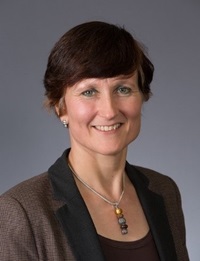
Christa Bouwman is the interim head of the Department of Finance, associate professor of finance, and the Patricia & Bookman Peters Professor of Finance at Mays Business School at Texas A&M University. She is also a fellow of the Wharton Financial Institutions Center at the University of Pennsylvania and a research member of the European Corporate Governance Institute (ECGI). Previously, Bouwman was an associate professor of banking and finance at Case Western Reserve University, where she held the Lewis-Progressive Chair. She has also served as a visiting assistant professor of finance at MIT’s Sloan School of Management, as a research associate at the Federal Reserve Bank of Cleveland, and as a visiting scholar with the Federal Reserve Bank of Boston and the Board of Governors of the Federal Reserve System.
Bouwman’s research interests are in financial intermediation and corporate finance. She is the co-editor-in-chief of the Journal of Financial Intermediation. She is a former associate editor of the Review of Finance, the Journal of Banking & Finance, and Corporate Governance: An International Review. Her research papers have been published in the American Economic Review, Journal of Financial Economics, Review of Financial Studies, Journal of Financial Intermediation, Journal of Financial Stability, Journal of Corporate Finance, Journal of Banking & Finance, and MIT / Sloan Management Review. She is a co-author of the book “Bank Liquidity Creation and Financial Crises,” published by Elsevier. She worked for five years at ABN AMRO Bank (in venture capital, project finance advisory, and capital structure advisory), and as a part-time litigation consultant for the U.S. Department of Justice. She received her Ph.D. in finance from the University of Michigan, her MBA from Cornell University, and received her Bachelor of Arts and a Master of Arts in economics and business (cum laude) from the University of Groningen – the Netherlands.

Michelle W. Bowman took office as the Vice Chair for Supervision of the Board of Governors of the Federal Reserve System on June 9, 2025, for a four-year term. Ms. Bowman has served as a member of the Board of Governors of the Federal Reserve System since taking office on November 26, 2018, to fill an unexpired term ending January 31, 2020. She was reappointed to the Board on January 23, 2020, and sworn in on January 30, 2020, for a term ending January 31, 2034.
Prior to her appointment to the Board, Ms. Bowman served as the state bank commissioner of Kansas from January 2017 to November 2018. She also served as vice president of Farmers & Drovers Bank in Kansas from 2010 to 2017. In addition to her experience in the banking industry, Ms. Bowman worked in Washington, D.C. for Senator Bob Dole of Kansas from 1995 to 1996 and served as a counsel to the U.S. House Committee on Transportation and Infrastructure and the Committee on Government Reform and Oversight between 1997 and 2002. In 2002, Ms. Bowman became director of congressional and intergovernmental affairs at the Federal Emergency Management Agency. From 2003 to 2004, she served as Deputy Assistant Secretary and policy advisor to Homeland Security Secretary Tom Ridge.
Following her time in Washington, D.C., Ms. Bowman led a government and public affairs consultancy based in London before returning to Kansas in 2010. Ms. Bowman received a BS in advertising and journalism from the University of Kansas and a JD from the Washburn University School of Law. She is a member of the New York Bar. Ms. Bowman is married with two children.

James Bullard is the president and CEO of the Federal Reserve Bank of St. Louis. In that role, he is a participant on the Federal Reserve’s Federal Open Market Committee (FOMC), which meets regularly to set the direction of U.S. monetary policy. He also oversees the Federal Reserve’s Eighth District, including activities at the St. Louis headquarters and its branches in Little Rock, Arkansas, Louisville, Kentucky, and Memphis, Tennessee. A noted economist and policymaker, Bullard makes Fed transparency and dialogue a priority on the international and national stage as well as on Main Street. He serves on the board of directors of the St. Louis Regional Chamber and the board of directors of Concordance Academy of Leadership, and he is a past board chair of the United Way U.S.A. Bullard is co-editor of the Journal of Economic Dynamics and Control, and a member of the Central Bank Research Association’s senior council. He is an honorary professor of economics at Washington University in St. Louis, where he also sits on the advisory council of the economics department and the advisory board of the Center for Dynamic Economics. A native of Forest Lake, Minnesota, Bullard received his doctorate in economics from Indiana University in Bloomington.
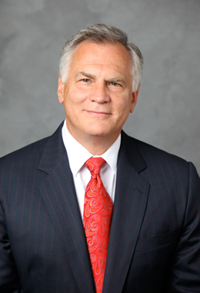
John Buran is president and CEO of Flushing Financial Corporation and Flushing Bank. He joined the bank as chief operating officer in 2001 and has served on its board of directors since 2003. During his tenure as president and CEO, Flushing Bank has grown from $2 billion in 2005 to $8 billion in total assets. Buran's banking career began in 1977 at Citibank, where he held a variety of senior management positions. He is a past chairman and current board member of the New York Bankers Association, as well as the chairman of the board of the Federal Home Loan Bank of New York. Previously, he served for six years as a member of the Community Depository Institutions Advisory Council of the Federal Reserve Bank of New York and for eight years as a member of the Nassau County Interim Finance Authority where he served eight years. Buran received his Bachelor of Science in management and his MBA from New York University.
Buran serves on the advisory board and is the former board president of Neighborhood Housing Services of New York City. He is a board member of the Korean American Youth Foundation and he serves on the board of the Long Island Conservatory. He is a recipient of the Long Island Association’s SBA Small Business Advocate Award. Mr. Buran was honored twice with St. Joseph’s College’s Distinguished Service Award. He was recently presented with an honorary Doctorate of Humane Letters from St. Francis College of Brooklyn and was the recipient of the Catholic Charities Gold Medal Award in 2019.
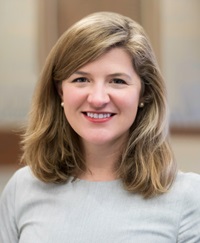
Meredith Covington is the manager of the Supervision Policy, Research and Analysis team at the Federal Reserve Bank of St. Louis. Previously, Covington led the Policy and Analysis team in the St. Louis Fed’s Community Development function. Prior to the Fed, Covington served as a director at the Center for Social Development at Washington University in St. Louis, and as the public policy and communications manager and development associate for Southern Bancorp Community Partners. Covington earned a bachelor’s degree in political science and pre-law at Spring Hill College and her master’s in public administration from the School of Public Service at DePaul University. She is currently pursuing a master’s degree in economics from University of Missouri-Columbia.
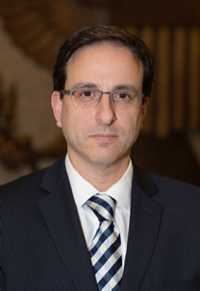
Robert M. DiChiara is the regional manager of the Federal Deposit Insurance Corp.'s (FDIC’s) Division of Insurance and Research New York Office. He directs research of economic and banking conditions in the Northeast. He also is head of the FDIC’s commercial real estate analytics team, which analyzes macro issues in the commercial real estate industry and has written analysis for FDIC publications such as the Annual Risk Review and the 2020 Community Bank Study. DiChiara has served in various roles with the FDIC, including as assistant director for research, during which he oversaw teams responsible for the Northeast, Southeast, and West Coast regions; as a senior large bank analyst, and as an FDIC University instructor for bank analysis and leadership. DiChiara graduated magna cum laude from Boston College with a Bachelor of Science in finance and has a MBA from the University of Massachusetts-Amherst. He also is a graduate of the American Bankers Association Graduate School of Banking.

Jim Edwards is Chief Executive Officer of United Bank, a closely held community bank serving nine suburban and rural counties in central Georgia. Since becoming CEO in 2002, he has led the bank’s growth to more than $2.2 billion in assets, making United Bank the sixth largest bank chartered in Georgia and one of the largest community banks that is 100% employee-owned in the country.
Jim is a past Chairman of the American Bankers Association, the largest bank trade association in the U.S., representing banks of all sizes nationwide. Currently, he serves as Vice Chairman of American Bankers Mutual Insurance Company. He has also chaired the ABA’s Community Bankers Council, the Georgia Bankers Association, and served on the FDIC’s Community Bank Advisory Committee.
Actively engaged in community and civic leadership, Jim currently serves as Vice Chairman of Upson Regional Medical Center and has chaired multiple local and regional boards. He is a graduate of Emory University, the University of Virginia Darden School of Business, and the Stonier Graduate School of Banking.
A native of Barnesville, Georgia, Jim and his wife, Dr. Laura Edwards, live in Forsyth and have three adult children.
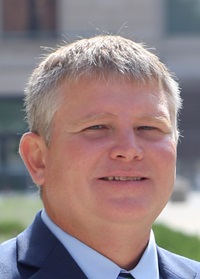
Tom Fite serves as the Director of the Indiana Department of Financial Institutions, a state regulatory department that supervises, charters and licenses financial service providers doing business in Indiana. As a lifelong public servant, Tom is excited to fulfill the Department’s mission. Now in his twenty-fourth year with the Department, Tom held many positions prior to being appointed Director in 2016. Tom represents state regulatory interests as a Federal Financial Institutions Examination Council member. He is a member of the FFIEC’s State Liaison Committee, a committee that he currently chairs. Recently, Tom was named Chairman of the Conference of State Bank Supervisors. Closer to home, Tom also chairs the Midwest Interagency Advisory Group, and he is chairman of the Indiana Executive Council on Cybersecurity Finance Committee. Tom supports the National Association of State Credit Union Supervisors as well, where he is a board member of the NISCUE education foundation.
Tom earned an undergraduate degree from Ball State University and a master’s degree in business administration from Indiana Wesleyan University. Tom and his wife of 21 years are raising their three children in Brownsburg, Indiana.

Jim Fuchs is a vice president at the Federal Reserve Bank of St. Louis, overseeing the operations of the bank’s Applications, Credit, Reserves, Statistics, Business Line Training Services, Quality Assurance, Digital Transformation Consulting, Supervision Policy Research and Analysis, and Supervision Outreach units. Fuchs also oversees a wide range of national outreach programs developed by the St. Louis Fed for community bankers and is a member of several Federal Reserve System workgroups focused on community banking issues. Fuchs also chairs the organizing committee the Federal Reserve/ Conference of State Bank Supervisors’/FDIC annual Community Banking Research Conference. Before joining the St. Louis Fed, Fuchs served as a banking policy adviser and directed financial communications for New York State Comptroller Thomas DiNapoli. Earlier, he was chief of staff to former New York State Banking Superintendent Diana Taylor and served as an advisor to New York City Mayor Michael Bloomberg. He is a former captain in the United States Air Force serving during Operations Desert Storm, Enduring Freedom, and Iraqi Freedom. Fuchs received his MBA from the University of Missouri-St. Louis and his Bachelor of Science from the U.S. Air Force Academy. He also earned a graduate certificate in communications from the University of Oklahoma and a teaching certificate in secondary mathematics from City College in New York. In addition, Fuchs is a graduate of the Department of Defense Information School and the American Academy of Dramatic Arts. He is also a graduate of the Stonier Graduate School of Banking at the University of Pennsylvania’s Wharton School of Business.

Ivan T. Ivanov is a senior economist in the Research Division of the Federal Reserve Bank of Chicago. Previously, he served as a principal economist with Systemic Financial Institutions and Markets section of the Research division with the Board of Governors of the Federal Reserve System. Ivanov’s research examines questions in financial intermediation, corporate finance, climate finance and public finance. His work centers on the financing of small-and medium-sized enterprises (SMEs) and the importance of banks for that process. His most recent research examines the effect of carbon pricing policy on the ability of SMEs and large companies to raise capital as well as the effectiveness of disclosure regulation in the municipal debt market. His research has been published in the Journal of Finance and the Journal of Financial Economics and has been cited in the Wall Street Journal, the Financial Times, Bloomberg, the Bond Buyer and the Harvard Law School Forum on Corporate Governance and Financial Regulation. Ivanov holds a Ph.D. in Finance from the University of Rochester, Rochester, New York and a Bachelor of Science in Mathematics and a Bachelor of Arts in Finance from Ramapo College of New Jersey.

Adam Tejs Jørring is an assistant professor of finance at the Boston College Carroll School of Management. He studies household and firm behavior in consumer credit markets, focusing on how competition, technology and behavioral biases affect the pricing and allocation of credit. He earned his Ph.D. in financial economics, a joint degree from the University of Chicago Department of Economics and the Chicago Booth School of Business. Prior to graduate school, Jørring worked for Goldman Sachs and the Danish Central Bank. He received his B.Sc. in economics at the University of Copenhagen.
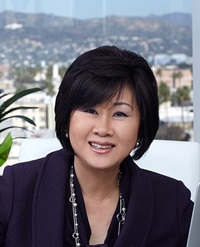
Joanne Kim is the president and CEO and a member of the board of directors for Commonwealth Business Bank, also known as CBB Bank. Headquartered in Los Angeles, California, CBB is a leading Korean American community bank serving a diverse customer base offering professional services and innovative banking solutions. Kim has led CBB Bank since April 2011. Under her leadership, CBB Bank has grown to $1.8 billion in total assets and continues to expand its presence. It currently has 10 full-service branches across southern California, Texas, and Hawaii, as well as several loan processing offices in other states. Kim graduated from Korea University and has built her banking career since 1980. Previously, she served as president and CEO and as a member of the board of directors for Wilshire Bank and its holding company. Kim currently serves as a member of the board of directors for the Western Bankers Association and AbilityFirst. She also serves as a council member of the Community Depository Institutions Advisory Council of the Federal Reserve Bank of San Francisco. She was named to the Los Angeles Business Journal's “Top Women in Banking” list in 2019 and to its “LA500: The Most Influential People in L.A.,” for the past two years.

David Krause is the chairman and CEO of Pioneer Bank, a $737 million state-chartered, Fed member community bank with nine locations in southern Minnesota. Pioneer was named a national finalist for the Extraordinary Bank of the Year award for four consecutive years from 2016 through 2019 and has been named a Top 150 Workplace in Minnesota by the Star Tribune newspaper. Pioneer has originated over $110 million of Paycheck Protection Program (PPP) loans since the program was introduced. This year marks the 35th year of service for Krause at Pioneer Bank. He was named president in 1996 and CEO in 2000. Prior to being named the CEO, Krause specialized in residential mortgage lending and business banking. During his tenure as CEO, the bank completed four merger and acquisition transactions and opened two de novo branches. From 2013 to 2017, Krause served on the board of directors of the Minnesota Bankers Association (MBA) and served as its chair from 2019-2020. Krause grew up on a family farm in southwest Minnesota and received his degree in business administration and management from Southwest Minnesota State University. He is the past chair of GreenSeam, a regional economic development organization focused on developing the agriculture and agri-business industry in southern Minnesota and northern Iowa.
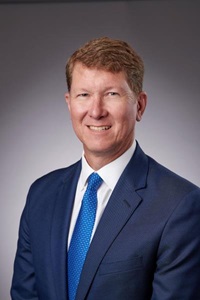
C.K. Lee is president and chief operating officer of Oklahoma City, Oklahoma-based InterBank. In this role, he oversees all of the bank’s operations, including lending and credit, loan and deposit operations, and the bank’s branch network. Lee joined the bank in the summer of 2020 and works out of its Fort Worth, Texas, location. Prior to joining InterBank, Lee was an investment banker, assisting bank and financial services clients in Texas and the surrounding region. During his investment banking career, he Lee handled dozens of merger and acquisition transactions on behalf of clients throughout the country, representing nearly $2 billion in aggregate deal value. He has assisted clients with Section 363 bankruptcy resolutions, strategic planning services, regulatory advisory work and expert witness assignments.
Lee began his career as a professional staff member on Capitol Hill and was a federal regulator for 10 years with the Federal Deposit Insurance Corp. (FDIC) and the Office of Thrift Supervision (OTS). During his time on Capitol Hill, he was a senior adviser to members of both the U.S. Senate and the U.S. House of Representatives, as well as the Senate Committee on Banking, Housing and Urban Affairs. During his 10 years as a regulator, he was a deputy to the Chairman of the FDIC and a member of the Basel Committee on Banking Supervision. He also oversaw the OTS’s international affairs, was a regulator of complex international holding companies, and was its regional director in Dallas, Texas for two years during the 2008-2010 financial crisis. Lee received his Bachelor of Science from the University of Florida and his Master of Science from the London School of Economics.
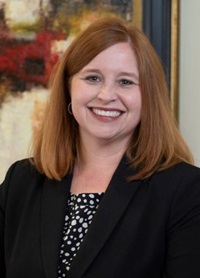
Susannah Marshall was appointed by Governor Asa Hutchinson to be the 22nd Commissioner of the Arkansas State Bank Department, starting October 1, 2020. Previously, Marshall had served as Deputy Bank Commissioner for 13 years. As commissioner, Marshall is responsible for the regulation, supervision and examination of Arkansas state-chartered banks, bank holding companies, a trust company, and Arkansas Capital Corporation. As of June 30, 2021, the agency supervised 73 state chartered commercial banks with total assets over $132.4 billion. Marshall has served the department since 1995, when she began her career as a commercial bank examiner. Marshall serves on the board of directors of the Conference of State Bank Supervisors (CSBS) and currently serves on various committees within the organization, including as chairman of a multi-state, regional regulatory committee. On April 1, 2021, Marshall was designated by CSBS to serve on the Federal Financial Institutions Examination Council’s state liaison committee. The two-year appointment will run through March 31, 2023. She also serves as a trustee on the board of directors of the Arkansas Teachers Retirement System and is a member of the State Board of Finance.
Marshall earned her bachelor’s degree in accounting from Arkansas State University, Jonesboro, Arkansas in 1995 and is a 2002 graduate of the Southwestern Graduate School of Banking, Dallas, Texas. In 2011, she was recognized by the Arkansas Business newspaper as one of its 40 under 40 Honorees, which recognizes intriguing business and political leaders under 40 years old who have made an impact on their company or community and show the potential to be a leader in business or politics.
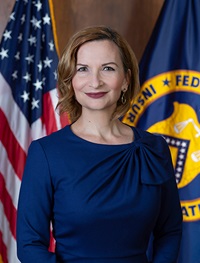 Jelena McWilliams was sworn in as the 21st chairman of the Federal Deposit Insurance Corp. (FDIC) on June 5, 2018. She serves a six-year term on the FDIC Board of Directors, and is designated as chairman for a term of five years. Prior to joining the FDIC, McWilliams was executive vice president, chief legal officer and corporate secretary for Fifth Third Bank in Cincinnati, Ohio. Prior to joining Fifth Third, she worked in the United States Senate for six years, most recently as chief counsel and deputy staff director with the Senate Committee on Banking, Housing and Urban Affairs, and as assistant chief counsel with the Senate Small Business and Entrepreneurship committee. From 2007 to 2010, McWilliams served as an attorney with the Federal Reserve Board of Governors. Before entering public service, she practiced corporate and securities law at Morrison & Foerster LLP in Palo Alto, California, and Hogan & Hartson LLP (now Hogan Lovells LLP) in Washington, D.C. She graduated with highest honors from the University of California at Berkeley with a Bachelor of Science in political science, and earned her Juris Doctor from the UC Berkeley School of Law.
Jelena McWilliams was sworn in as the 21st chairman of the Federal Deposit Insurance Corp. (FDIC) on June 5, 2018. She serves a six-year term on the FDIC Board of Directors, and is designated as chairman for a term of five years. Prior to joining the FDIC, McWilliams was executive vice president, chief legal officer and corporate secretary for Fifth Third Bank in Cincinnati, Ohio. Prior to joining Fifth Third, she worked in the United States Senate for six years, most recently as chief counsel and deputy staff director with the Senate Committee on Banking, Housing and Urban Affairs, and as assistant chief counsel with the Senate Small Business and Entrepreneurship committee. From 2007 to 2010, McWilliams served as an attorney with the Federal Reserve Board of Governors. Before entering public service, she practiced corporate and securities law at Morrison & Foerster LLP in Palo Alto, California, and Hogan & Hartson LLP (now Hogan Lovells LLP) in Washington, D.C. She graduated with highest honors from the University of California at Berkeley with a Bachelor of Science in political science, and earned her Juris Doctor from the UC Berkeley School of Law.

Dominik Mjartan is president and CEO of Optus Bank, a U.S. Treasury-certified Community Development Financial Institution (CDFI) and an FDIC-designated Minority Depository Institution. Under his leadership, Optus Bank reached over $300 million in assets up from a low of $47 million while directing nearly 90% of loans to underserved communities, businesses and people. Mjartan became president and CEO of Optus in 2017 after serving more than a decade as a senior executive officer at Southern Bancorp, most recently as the executive vice president of Southern Bancorp Inc., Southern Bancorp Bank's holding company. He also served as CEO of an affiliated lending company, Southern Bancorp Community Partners. He is a past chair of the CDFI Coalition. Currently, he is a director of the Community Development Bankers Association and the National Bankers Association. He also serves on the board of directors of the South Carolina Association for Community Economic Development, the Opportunity Center and the South Carolina Bankers Association. Mjartan is the finance chair of Midlands Arts Conservatory and serves on the finance committee of Women’s Rights & Empowerment Network. Mjartan received his Bachelor of Science in management from University of Arkansas at Little Rock, graduating summa cum laude, and received his MBA from the University of Ulster in the United Kingdom, graduating with distinction.
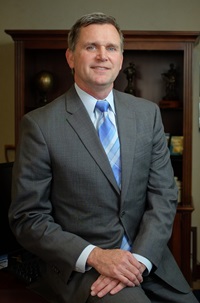
Jim Nicholson is the president and CEO of North Valley Bank of Zanesville, Ohio. He joined North Valley in October 2015, returning to Zanesville after spending 15 years as part of the executive leadership teams for several Northeast Ohio community banking organizations. These included serving as a regional president for Huntington Bank, as the chief financial officer for Park View Federal Savings Bank and as the chief financial officer for Lorain National Bank. Previously, he served as president and CEO of The First National Bank of Zanesville and its successor, Unizan Bank. Before entering the banking industry, he practiced in public accounting with Coopers & Lybrand (now PricewaterhouseCoopers) in Columbus, Ohio. Nicholson earned his Bachelor of Arts in accounting from Muskingum University, graduating summa cum laude and as salutatorian. He is also a graduate of The Ohio State University Fisher College of Business Huntington Executive Leadership Program.

Carlos Parra received his Ph.D. in finance from the McCombs School of Business at the University of Texas at Austin and is working as an assistant professor of finance at Pontifical Catholic University of Chile, Santiago, Chile. His primary research interests are in financial intermediation, household finance,and empirical corporate finance. In addition, his research uses quasi-experimental research designs to investigate the effect of financial regulations and the consequences of household financial distress.

Andrea Passalacqua is a financial economist in the Stress Testing Research section within the Supervision and Regulation division at the Board of Governors of the Federal Reserve System. He obtained his Ph.D. from Harvard University in Spring 2020 under the supervision of Jeremy Stein (chair), Marco Di Maggio, Josh Lerner, David Scharfstein and Adi Sunderam.
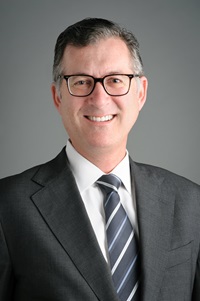
John W. Ryan is the president and CEO of the Conference of State Bank Supervisors, the national association representing state banking supervisors and the leading advocate for advancing the state banking system. Before being named CSBS president and CEO in August 2011, Ryan was CSBS's executive vice president, a position he had held since October 2003. He first joined CSBS in 1997 as an assistant vice president for legislative affairs. Prior to joining CSBS, Ryan worked at Newmyer Associates, a public affairs consulting firm, where he led the company's financial services consulting practice. Previous to his work at Newmyer Associates, Ryan spent four years as a professional staff member to the U.S. House of Representatives Committee on Banking, Finance and Urban Affairs. Ryan received a bachelor's degree in political science and economics from the University of California-Berkeley.
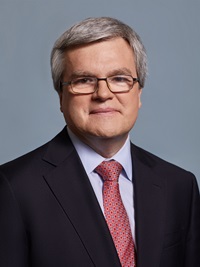
João Santos is senior vice president and policy leader for Microprudential Supervision at the Federal Reserve Bank of New York. He is also a professor at the Nova School of Business and Economics in Lisbon, Portugal. His research interests include financial systems design, banking, banking regulation and corporate finance. His articles have been published in various academic journals including the Journal of Finance, Review of Financial Studies and Journal of Financial Economics. He is a co-editor of the Journal of Financial Intermediation, and is an associate editor of various journals including the Journal of Money Credit and Banking and the Journal of Financial Services Research. Santos joined the Federal Reserve Bank of New York in May 2000. From 1997 to 2000, he was with the Bank for International Settlements, and from 1994 to 1997, he was with the Federal Reserve Bank of Cleveland. From 1992 to 1994, he was a lecturer in the department of economics at Boston University. Santos received his master’s and doctorate degrees in economics from Boston University in 1995.

Alisha Sears is a senior analyst in the policy development group with the Conference of State Bank Supervisors (CSBS). Sears provides analytical and operational support to the regulatory committee, the legislative committee and the state supervisory processes committee, as well as taskforces, and interagency groups that contribute to the CSBS policy development process. She has also been integral in planning and managing several projects associated with the Community Banking Research Conference. Prior to joining CSBS in the spring of 2018, Sears was with the Financial Industry Regulatory Authority (FINRA). She has also held positions with the Securities and Exchange Commission (SEC), law firms and an investment advisory firm. Sears received her Juris Doctor from the University of Maryland and her undergraduate degree from the University of Michigan. She is a member of the Maryland State Bar Association and the American Bankers Association Banking Law Committee, as well as Women in Housing and Finance.

Padma Sharma is an economist at the Federal Reserve Bank of Kansas City. Her main research interests are in the areas of banking and econometrics. In her recent research, she quantifies the impact of government guarantees on bank balance sheets and evaluates the economic effects of distress in the banking sector by developing new econometric tools. Sharma received her Ph.D. in economics from the University of California at Irvine and was a dissertation intern at the Federal Reserve Bank of New York. She received her Bachelor of Science in economics, mathematics and statistics from Bangalore University and her Master of Science in economics from the Indira Gandhi Institute of Development Research, Mumbai, India. Prior to receiving her Ph.D., Sharma was a banker and a consultant, and developed statistical models of regulatory capital for banks in Europe, Asia and North America.
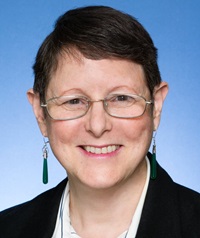
Lynn Shibut is a senior economist at the Federal Deposit Insurance Corp (FDIC). Prior to joining the FDIC in 1996, she worked at the Federal Savings and Loan Insurance Corp. and the Resolution Trust Corp. She has spent most of her career doing analyses to support internal decisions at financial regulators on a variety of topics, but she has also done external reporting and academic research. Her primary research interests are in the areas of bank failure, failed bank resolution and loan losses. Shibut is also interested in financial crises, prompt corrective action, deposit insurance, market discipline, fair lending, regulatory burden and personal finance.
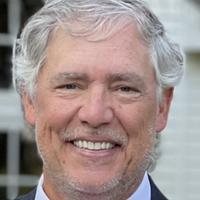
Thomas Siems is the chief economist with the Conference of State Bank Supervisors (CSBS). He joined CSBS in 2019 after serving 34 years at the Federal Reserve Bank of Dallas and more than 20-year teaching at Southern Methodist University in Dallas. Siems earned a Bachelor of Science in industrial and operations engineering from the University of Michigan and his Master of Science and Ph.D. degrees in operations research from Southern Methodist University. Siems is also a graduate of the Graduate School of Banking at Colorado and has published more than 75 articles in academic, Federal Reserve and referred journals. He delivered a 2015 TEDxSMU Talk, “The Wealth of Innovations,” and has authored five children’s picture books, including “The Dangerous Pet,” which poetically helps readers understand the dangers of debt.

Brian Sullivan is a senior media relations officer with the Federal Deposit Insurance Corp. (FDIC) and host of the FDIC Podcast. For more than 20 years, he has served in the public sector as a spokesperson and public affairs specialist for the FDIC, the U.S. Department of Housing and Urban Development (HUD), and the Federal Housing Administration (FHA). Prior to his government experience, Sullivan spent the first 20 years of his professional career in broadcasting, which included reporting, editing and producing local and national news at Milwaukee Public Radio, the former Mutual Broadcasting System, Westwood One, NBC Radio and WJLA-TV in Washington, D.C. He received his Bachelor of Arts in journalism from the University of Wisconsin-Madison. Growing up in the D.C. area, Sullivan will tell you he got his real start in the media early on when he delivered newspapers for the Washington Post and Evening Star.

Rimmy E. Tomy is an associate professor of accounting at the University Of Chicago Booth School Of Business. Her research primarily relates to regulation and enforcement in the financial sector. Tomy is interested in the role of external monitors in corporate oversight, and the role that informal institutions and community-based enforcement play in ensuring compliance. Her research also studies how accounting and other regulation can have unintended consequences because of firms’ strategic reaction to regulation. Effective enforcement requires an understanding of how firms take calculated actions in response to enacted and proposed regulation. Her work has been published in top journals such as The Review of Financial Studies and the Journal of Accounting and Economics. Tomy earned her Ph.D. from the Stanford Graduate School of Business and a B.Sc. from St. Stephen’s College, University of Delhi. Prior to entering graduate school, she worked at Ernst & Young LLP (Advisory Services) and McKinsey & Company (Global Corporate and Investment Banking).

Gregory F. Udell is the Chase Chair of Banking and Finance at the Kelley School of Business at Indiana University. He is, or has been, a visiting economist, scholar and/or consultant to the Board of Governors of the Federal Reserve System, the Bank of Japan, the Bank of Italy, the European Central Bank, the Federal Reserve Banks of Chicago and San Francisco, the International Finance Corp., the Organisation for Economic Co-operation and Development, the People's Bank of China, the Riksbank and the World Bank. Before joining the Kelley School of Business in 1998, he was a professor of finance and director of the William R. Berkley Center for Entrepreneurial Studies at the Stern School of Business at New York University. Prior to his academic career, Udell was a commercial loan officer in Chicago. His work focuses mostly on financial contracting, credit availability and financial intermediation and it has been published in nearly 100 publications, including leading accounting, economics and finance journals. He is the author of a textbook on asset based lending, Asset-Based Finance (2004), a co-author (with L. Ritter and W. Silber) of Principles of Money, Banking and Financial Markets, 12th edition (2009), and is, or has been, an associate editor/editorial board member of seven academic journals including the Journal of Money, Credit and Banking, the Journal of Banking and Finance, the Journal of Financial Services Research and Small Business Economics.

Prithu Vatsa is a Ph.D. candidate at the University of Miami. Prior to pursuing his Ph.D., he worked as an investment officer for an environmental, social and corporate governance-focused private equity fund. Before that, he quarterbacked financial transactions, raising debt and equity for renewable energy and fossil-fuel-based power eneration projects. He has worked for large financial institutions across the globe in a career spanning more than a decade. He holds an MBA in finance from the University of Rochester, a Master of Science in entrepreneurship from the University of Florida, and a bachelor's degree in electronics and telecommunications engineering from the University of Pune, Pune, India.

Jing Wen is an assistant professor in the department of accountancy at City University of Hong Kong (CityU), where she teaches Corporate Accounting I to undergraduate students. Prior to joining the faculty of CityU, Wen earned her Ph.D. in accounting from Columbia University. She received her bachelor’s degree in financial engineering from the Renmin University of China. Wen is broadly interested in examining how financial regulations affect corporate decisions, such as risk-taking, mergers and acquisitions, and tunneling.
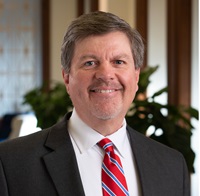
Carl White is the senior vice president of the Supervision, Credit, Community Development and Learning Innovation division at the Federal Reserve Bank of St. Louis. White has more than 35 years of experience in the Supervision Division of the Federal Reserve Bank of St. Louis. He is currently senior vice president of the Supervision, Credit and Learning Innovation Division. He has served in various other roles within Safety and Soundness, beginning his career as an examiner. Mr. White has served as lead instructor and course developer on numerous Fed System training courses, including an international assignment in Brazil. In addition, he served as the central point of contact for the District’s largest state member bank before and during the financial crisis. He and his team were nominated for the District’s President’s Award for Innovation as a result of efforts to implement and enhance off-site loan review and examination processes. Mr. White holds a bachelor’s degree with a major in finance from St. Louis University.
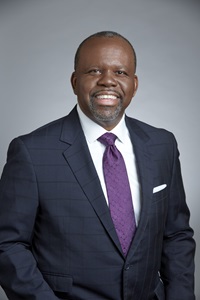
Darrin Williams is the CEO of Arkadelphia, Ark.-based Southern Bancorp Inc., a $1.2 billion asset financial organization with more than 80,000 customers and 43 locations primarily in underserved markets in the Mid-South. As CEO, Williams oversees the strategic direction and operations of each of Southern's three Community Development Financial Institutions: Southern Bancorp Inc., a bank holding company; Southern Bancorp Bank, one of America's largest rural development banks; and Southern Bancorp Community Partners, a 501(c)(3) development finance and lending organization – collectively known as "Southern." Prior to leading Southern, Williams served as managing partner at the law firm of Carney, Williams, Bates, Pulliam & Bowman, PLLC, where he represented institutional investors and consumers in class action litigation against some of the nation's largest publicly traded companies. He also served three terms in the Arkansas House of Representatives (2008-2013), serving as Speaker Pro Tempore of the 89th Arkansas General Assembly. He was listed as one of 12 state legislators from around the country to watch by Governing magazine. Williams received his Bachelor of Arts from Hendrix College, Conway, Ark.; his Juris Doctor from Vanderbilt University School of Law, Nashville, Tenn.; and his Master of Laws degree in securities and financial regulation from Georgetown University Law Center in Washington, D.C.
Video Gallery

